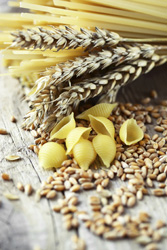Optimising bread and pasta wheat yields in the Med
Wheat and human evolution are inextricably linked. One of the first domesticated crops in the Stone Age, improvement of the ancient crop allowed the transition from hunter-gatherer to a more settled agrarian lifestyle. Selection for increased grain size and non-shattering seed over the centuries has produced the two main types of cereal grown today – durum and bread wheat. Durum wheat is grown predominantly in the Mediterranean basin and is used for pasta. Water availability for wheat crops is of increasing concern. As it is, rainfall in these regions is relatively low and uncertain. Projected rainfall patterns in a global warming scenario will exacerbate this problem. The 'Exploiting the wheat genome to optimise water use in Mediterranean ecosystems' (Tritimed) project aimed to further select lines of wheat that will cope with restricted and erratic rainfall patterns. Consortium scientists investigated and identified crop traits and genetic ideotypes that give a stable yield in Mediterranean conditions. Ideotypes are described in terms of traits that are thought to enhance genetic yield capacity. Under field conditions, Tritimed scientists selected the best durum and bread wheat lines for incorporation into breeding programmes. Relevant quantitative trait loci (QTLs) from these strains were identified as well as new molecular markers. Continuing with the genetic theme, the researchers designed and constructed a wheat chip for gene expression studies. Tritimed used state-of-the-art genomic techniques to train young scientists in west Asian and north African (WANA) countries. Also from a socioeconomic angle, project researchers studied feedback from the local farming community on issues such as adoption of new recommendations and opinions on the new strains. The overall economic impact on local farmers as well as the profitability of national research programmes was also determined. In the face of increasing imports of bread wheat into the Mediterranean region, Tritimed research could well be instrumental in reducing this economic burden. Genomic training for young scientists from WANA will help to ensure that the pace of genetic selection in arable crops for drought-ridden countries keeps up with an ever-changing environment.







